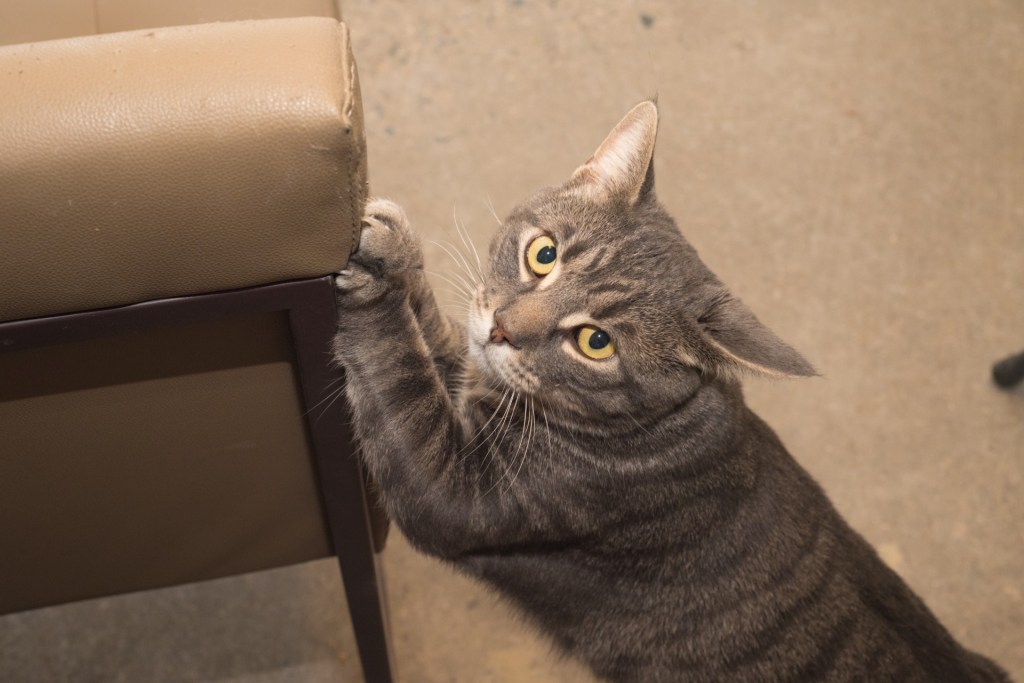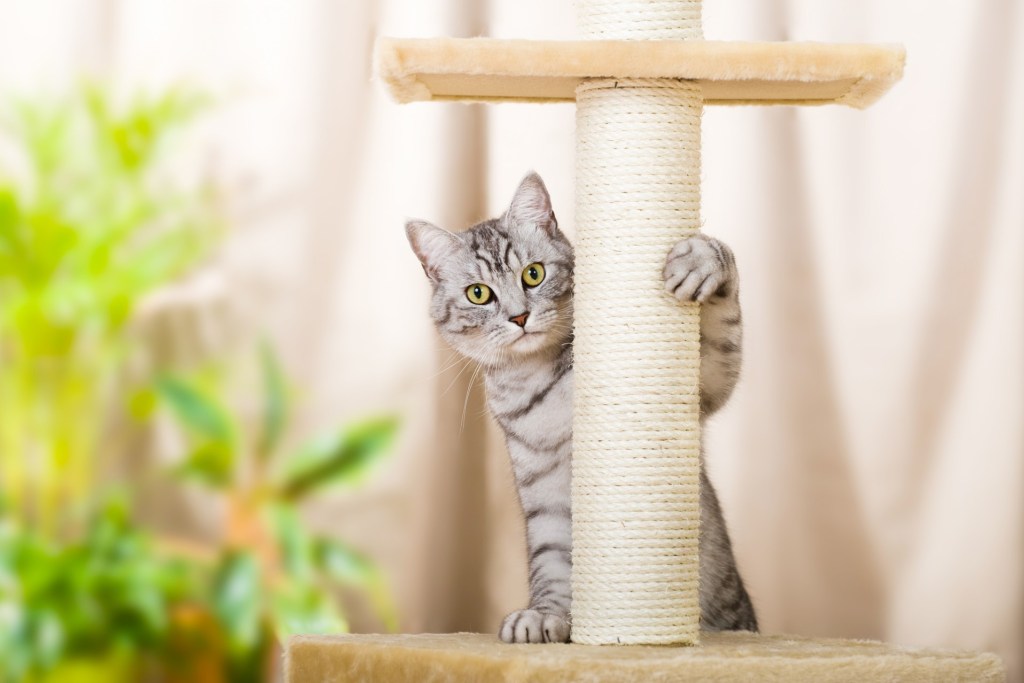You’d never trade your cat for peace and quiet or an empty house, but now there are scratch marks on your favorite furniture. It’s gone too far. Your cat is your companion, but it’s time to learn some manners!
Scratching is a distinct cat behavior, but you don’t have to sacrifice your furniture to keep your cat happy. You can find a way to satisfy your cat’s urge to scratch in a healthy and less irritating way. Let’s take a look at a few reasons your cat might be clawing and how to stop a cat from scratching the furniture.
Why cats need to scratch

In the wild, the natural movement of cats through the brush, climbing trees, or walking over uneven terrain helps keep nails sharp and trimmed. Cat claws grow continuously, so kitties need to wear away the old outer shell to keep claws healthy and, more importantly, sharp.
House cats live a life of leisure, causing them to lose some of their ability to wear down old claw material. Your cat will develop an instinctual drive to scratch at things to help renew claws. They’ll use anything near them, including your nice couch. Scratching is also a way to release excess energy or to alleviate boredom. House cats may be missing the engagement and interest of their outdoor counterparts, and that boredom makes your furniture the perfect target.
Indoor felines often develop a preference for specific textures and locations, which is why that fancy scratching post goes unused in favor of the material on your couch. That doesn’t mean you’re doomed to marred sofa arms. You’ll just have to get creative.
At what age do cats stop clawing?

When cats develop bad habits while young, it becomes even harder to get rid of this quirk later on. Many kittens do naturally grow out of this behavior, though, so don’t freak out that your youngling still enjoys some furniture rubbing now and then. By the time they’re 1 or 2 years old, kitty should not still scratch regularly.
Introducing some of these techniques early can help ease the transition to scratching posts instead of armchairs. Occasionally, continuing to scratch indicates a deeper issue — like your cat could be in pain or have another medical condition. Of course, she may also need a trip to the groomer to get those nails trimmed.
How to discourage the wrong scratching

Here are our best tips and tricks for keeping your cat’s claws healthy while discouraging the destruction that happens when your pet is left to its own devices.
Buy a scratching tool
Chances are that this was your first move, but if not, it’s time to get a scratching tool. Whether you choose a post, board, or some other type of tool will depend on your cat’s natural personality.
If you notice that your cat loves to scratch on the arms or back of furniture, the vertical stretch may be part of the preference. A tall scratching post can help get that stretch. If your animal prefers to gouge the seat of your furniture, a flat pad may be more to your cat’s liking. Consider the material as well. For beasties who show a preference for a specific type of material over others, try to find something similar in your scratching post. That way, your cat is more likely to use it.
Shop cat trees, condos, and scratchers
Scratch-proof your cat’s favorite spot
If your cat scratching tool isn’t working on its own, it’s time to make the undesirable spot as unappealing as possible.
- Use double-sided tape — Cats hate having something stuck to their paws, and double-sided tape may turn them off your sofa arm for good.
- Use foil — Your chair may look strange with aluminum foil on the seat, but the texture, sound, and appearance is off-putting to many cats. Leave it on until your cat is using the scratching post regularly.
- Use a deterrent spray — Deterrent sprays are safe for cats and furniture, but the odor is something cats don’t like. Test a small spot on your furniture first and watch for any adverse reactions from your cat.
Increase enrichment
Cats may scratch furniture because of boredom or stress, which means it’s time to evaluate your cat’s daily routine. Is your furry friend getting enough exercise? Enough time with you? Enough mentally stimulating activities? Find toys that encourage your cat to exercise and use them when you get home from work or any other time she seems particularly excited to see you. These toys help her healthily release excess energy.
Invest in some puzzle games or create them to help your cat’s natural curiosity. These can help with boredom while you’re at work or on those slow weekends when you aren’t very active. They can even help you encourage healthy eating with puzzle feeding toys that unlock her hunting instinct.
Shop cat toys at Chewy
Encouraging healthy scratching step by step

Once you’ve purchased a cat scratching post and you’ve increased your cat’s engagement activities, it’s time to retrain your four-legged friend to scratch correctly.
- Place the scratching post or tool near your cat’s favorite scratching spot.
- Encourage her to scratch by spending time at the scratching tool.
- Move the tool slowly away from the previous scratching spot to a place where you’d like the scratching to happen. Move slowly day by day.
- Don’t give up. If your cat doesn’t follow your direction, it could be the scratching tool. Change out the style or material to find something that appeals to your individual cat.
Scratching must remain a part of your cat’s life, but there are ways you can direct it. Removing claws isn’t on the table for health and safety reasons, so combine proper scratching tools, scratch deterrents, and plenty of enrichment to help your indoor cat alleviate scratching needs without driving you crazy.




